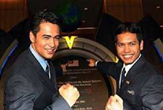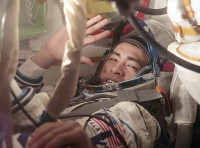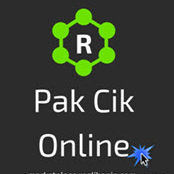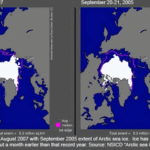 Muslim-majority Malaysia's first astronaut will get guidelines allowing flexibility in praying in zero gravity and eating space meals under Islamic rules, the country space chief said Monday.
Muslim-majority Malaysia's first astronaut will get guidelines allowing flexibility in praying in zero gravity and eating space meals under Islamic rules, the country space chief said Monday.
The government-prepared advice is for a Malaysian joining a Russian scientific mission on the International Space Station in October, Malaysia's National Space Agency chief Mazlan Othman told The Associated Press.
Officials have previously said an Islamic code of conduct in space is necessary because few Muslims have embarked on such expeditions, and there have been no standardized guidelines for them.
Malaysia's two finalists for the voyage, Sheikh Muszaphar Shukor and Faiz Khaleed, are now training in Moscow. They were selected from more than 10,000 candidates.
Malaysia held a forum for Islamic scholars in April 2006 to discuss problems Muslim space travelers might face, such as pinpointing the Saudi holy city of Mecca, which Muslims are expected face when they pray five times a day.
The guideline booklet, published this month, says the direction should be determined “according to the capability” of the astronaut.
Those in space during the holy fasting month of Ramadan — when Muslims are required to go without food or water from sunrise to sunset — can choose to fast then or to make up for it when they return, the booklet says.
The first Malaysian astronaut's stint will likely overlap with Ramadan, which starts in mid-September this year.
If Muslim astronauts doubt whether a meal is halal, or prepared according to Islamic rules, they “should consume it only to the extent of restraining hunger,” the guidelines say.
The astronaut must be dressed decently whenever in public view, which involves covering at least the portion of the body between the navel and the knees for men. Both of the finalists for Malaysia's first astronaut are males.
Maintaining Islamic beliefs “is mandatory for Muslims in every situation, time and place,” Mustafa Abdul Rahman, who heads Malaysia's state-run Department of Islamic Development, said in the guidelines.
“Circumstances on the ISS which are different from circumstances on Earth are not an obstacle for an astronaut to fulfill a Muslim's obligations,” he said.
Other Muslims who have gone to space include Saudi Arabia's Prince Sultan bin Salman, who went aboard the U.S. shuttle Discovery in 1985, and Anousheh Ansari, an Iranian-American telecommunications entrepreneur who went to the ISS in September 2006.
Source: http://www.space.com/

The team of Malaysian scientists has been in Moscow since Sept 17 to prepare for the scientific experiments the Angkasawan will conduct in space.
But apart from the challenges of fasting in a foreign land and missing Hari Raya with their families, the team also found the going riddled with uncertainties and obstacles, Prof A Rahman A Jamal said in an email to The Star.
Members of the first team to arrive in Moscow with him were Universiti Kebangsaan Malaysia’s Prof Ramelah Mohamed (who is heading the microbes in space experiments), Universiti Putra Malaysia’s Prof Raja Noor Zaliha Raja Abd Rahman (heading the protein crystallisation in space), and Prof Hapizah Nawawi and Dr Gabriele Ruth Anisah Froemming from Universiti Teknologi Malaysia (heading the subprojects on endothelial cells and osteoblasts).
“This was not going to be a smooth ride, but we have a good team of scientists ready to face and solve any problem,” said Prof Rahman, principal investigator for the cancer cells in space experiment. He is UKM’s Medical Molecular biology Institute (Umbi) director.
While waiting for their flight at the KL International Airport, they discovered that three of them only had single-entry visas to Russia.
“As we will leave Russia to enter Kazakhstan and return to Moscow after the launch (of the Soyuz spacecraft set to take off on Oct 10, taking the Angkasawan to the International Space Station) this meant that we would not be allowed to re-enter Russia,” he said.
When that was solved after frantic calls, their first consignment of equipment (weighing 800kg) that arrived on Sept 7 was confiscated by Russian Customs.
Astronautic Technology Sdn Bhd, which handled the logistics, later got the equipment released.
The second batch of scientists were hit with RM21,000 in excess baggage fees at the KLIA before boarding Malaysia Airlines.
Though they got a 50% discount, they discovered on landing that three boxes containing the biological specimens had mysteriously disappeared.
They initiated Plan B by asking project director Kol Dr Zulkeffeli Mat Jusoh (who was flying in to Moscow the following night) to carry some more biospecimens.
Source: http://www.thestar.com.my/
Related Posts















Pingback: Malaysia to Issue Rules for Astronauts « acahmakenon